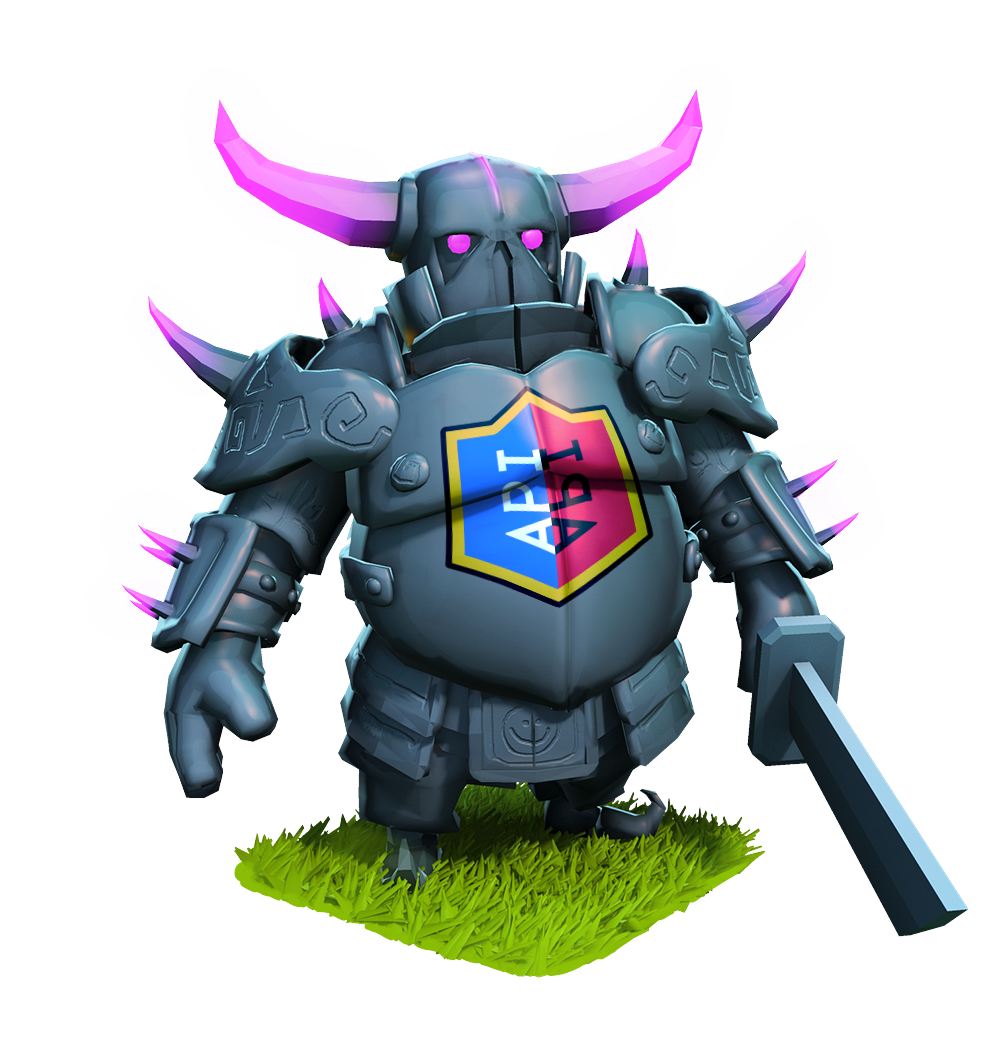P.E.K.K.A is a client library (C# wrapper) targeting .NET Standard 2.0 and .NET 4.6.1 that provides an easy way to interact with both official Clash Royale API and unofficial public API Royale API
All API requests must be accompanied by a developer key. You need to register then create a key for Clash Royale API (official) on Clash Royale API Website. You can learn how to obtain and manage your developer key for Royale API (unofficial) on Royale API Website.
| Stable | Nightly | |
|---|---|---|
| Clash Royale API Client |  |
 |
| Royale API Client |  |
 |
- .NET 4.6.1 (Desktop / Server)
- .NET Standard 2.0
- Dependency injection friendly (can also be used standalone, see below)
- Supports async and sync (via extension method, see below) calls.
| Logo | Stable | Nightly | |
|---|---|---|---|
| P.E.K.K.A Clash Royale API (official) |  |
 |
 |
| P.E.K.K.A Royale API (unofficial) |  |
 |
 |
Following commands can be used to install both Pekka.ClashRoyaleApi.Client and Pekka.RoyaleApi.Client, run the following command in the Package Manager Console
Install-Package Pekka.ClashRoyaleApi.Client
Install-Package Pekka.RoyaleApi.Client
Or use dotnet cli
dotnet Pekka.ClashRoyaleApi.Client
dotnet Pekka.RoyaleApi.Client
The usage of both Pekka.ClashRoyaleApi.Client and Pekka.RoyaleApi.Client libraries are similar. And both can be used with any DI library, or it can be used standalone.
If you do not want to use any DI framework, you have to instantiate ClashRoyaleApiStandalone or RoyaleApiStandalone as follows.
ApiOptions apiOptions = new ApiOptions("<your token>", "https://api.royaleapi.com/");
var apiClientContext = RoyaleApiStandalone.Create(apiOptions);
IPlayerClient playerClient = apiClientContext.PlayerClient;
IClanClient clanClient = apiClientContext.ClanClient;
IVersionClient clanClient = apiClientContext.VersionClient;ApiOptions apiOptions = new ApiOptions("<your token>", "https://api.clashroyale.com/v1/");
var apiClientContext = ClashRoyaleApiStandalone.Create(apiOptions);
IPlayerClient playerClient = apiClientContext.PlayerClient;
IClanClient clanClient = apiClientContext.ClanClient;
ITournamentClient tournamentClient = apiClientContext.TournamentClient;
ICardClient cardClient = apiClientContext.CardClient;
ILocationClient locationClient = apiClientContext.LocationClient;apiClientContext contains all necessary clients.
First, you need to install Microsoft.Extensions.DependencyInjection and Microsoft.Extensions.Http NuGet package as follows
dotnet add package Microsoft.Extensions.DependencyInjection
dotnet add package Microsoft.Extensions.Http
By installing Microsoft.Extensions.Http you will be able to use HttpClientFactory.In the words of the ASP.NET Team it is “an opinionated factory for creating HttpClient instances” and is a new feature comes with the release of ASP.NET Core 2.1.
If you don't want to use HttpClientFactory, you must register HttpClient yourself with the container.
Register necessary dependencies to ServiceCollection as follows
ApiOptions apiOptions = new ApiOptions("<your token>", "https://api.clashroyale.com/v1/");
var services = new ServiceCollection();
services.AddSingleton(apiOptions);
services.AddHttpClient<IRestApiClient, RestApiClient>((provider, client) =>
{
var options = provider.GetRequiredService<ApiOptions>();
client.BaseAddress = new Uri(options.BaseUrl);
client.DefaultRequestHeaders.Authorization = new AuthenticationHeaderValue("Bearer", options.BearerToken);
});
services.AddTransient<IPlayerClient, PlayerClient>();
services.AddTransient<IClanClient, ClanClient>();
services.AddTransient<ITournamentClient, TournamentClient>();
services.AddTransient<ICardClient, CardClient>();
services.AddTransient<ILocationClient, LocationClient>();
services.AddTransient<IGlobalTournamentClient, GlobalTournamentClient>();
ServiceProvider buildServiceProvider = services.BuildServiceProvider();
var playerClient = buildServiceProvider.GetRequiredService<IPlayerClient>();
var clanClient = buildServiceProvider.GetRequiredService<IClanClient>();
var tournamentClient = buildServiceProvider.GetRequiredService<ITournamentClient>();
var cardClient = buildServiceProvider.GetRequiredService<ICardClient>();
var locationClient = buildServiceProvider.GetRequiredService<ILocationClient>();
var globalTournamentClient = buildServiceProvider.GetRequiredService<IGlobalTournamentClient>();See sandbox project for more examples.
Register necessary dependencies to ServiceCollection as follows
ApiOptions apiOptions = new ApiOptions("<your token>", "https://api.royaleapi.com/");
var services = new ServiceCollection();
services.AddSingleton(apiOptions);
services.AddHttpClient<IRestApiClient, RestApiClient>((provider, client) =>
{
var options = provider.GetRequiredService<ApiOptions>();
client.BaseAddress = new Uri(options.BaseUrl);
client.DefaultRequestHeaders.Authorization = new AuthenticationHeaderValue("Bearer", options.BearerToken);
});
services.AddTransient<IPlayerClient, PlayerClient>();
services.AddTransient<IClanClient, ClanClient>();
services.AddTransient<IVersionClient, VersionClient>();
services.AddTransient<IConstantClient, ConstantClient>();
var buildServiceProvider = services.BuildServiceProvider();
var playerClient = buildServiceProvider.GetRequiredService<IPlayerClient>();
var clanClient = buildServiceProvider.GetRequiredService<IClanClient>();
var versionClient = buildServiceProvider.GetRequiredService<IVersionClient>();
var constantClient = buildServiceProvider.GetRequiredService<IConstantClient>();
var restApiClient = buildServiceProvider.GetRequiredService<IRestApiClient>();See sandbox project for more examples.
There are two ways to call an endpoint. The only difference is the return types. The methods that end with ResponseAsync returns ApiResponse<TModel> which contains model itself, HTTP status codes, error message and response headers.
ApiResponse<Player> playerResponse = await playerClient.GetPlayerResponseAsync(playerTag);
if(playerResponse.Error)
{
HttpStatusCode statusCode = playerResponse.HttpStatusCode;
string errorMessage = playerResponse.Message;
IDictionary<string, string> headers = playerResponse.Headers;
string urlPath = playerResponse.UrlPath;
// Handle http error
}
Player player = playerResponse.Model;The methods that end with Async returns model itself without additional HTTP response information. But in the case of HTTP error, you need to handle exceptions.
Player player = await playerClient.GetPlayerAsync(playerTag);For synchronous calls, Task extension method RunSync can be used.
var player = playerClient.GetPlayerResponseAsync(playerTag).RunSync();But there is a possibility that this extension method can't cover all cases. See Stackoverflow article
Licensed under MIT, see LICENSE for the full text.